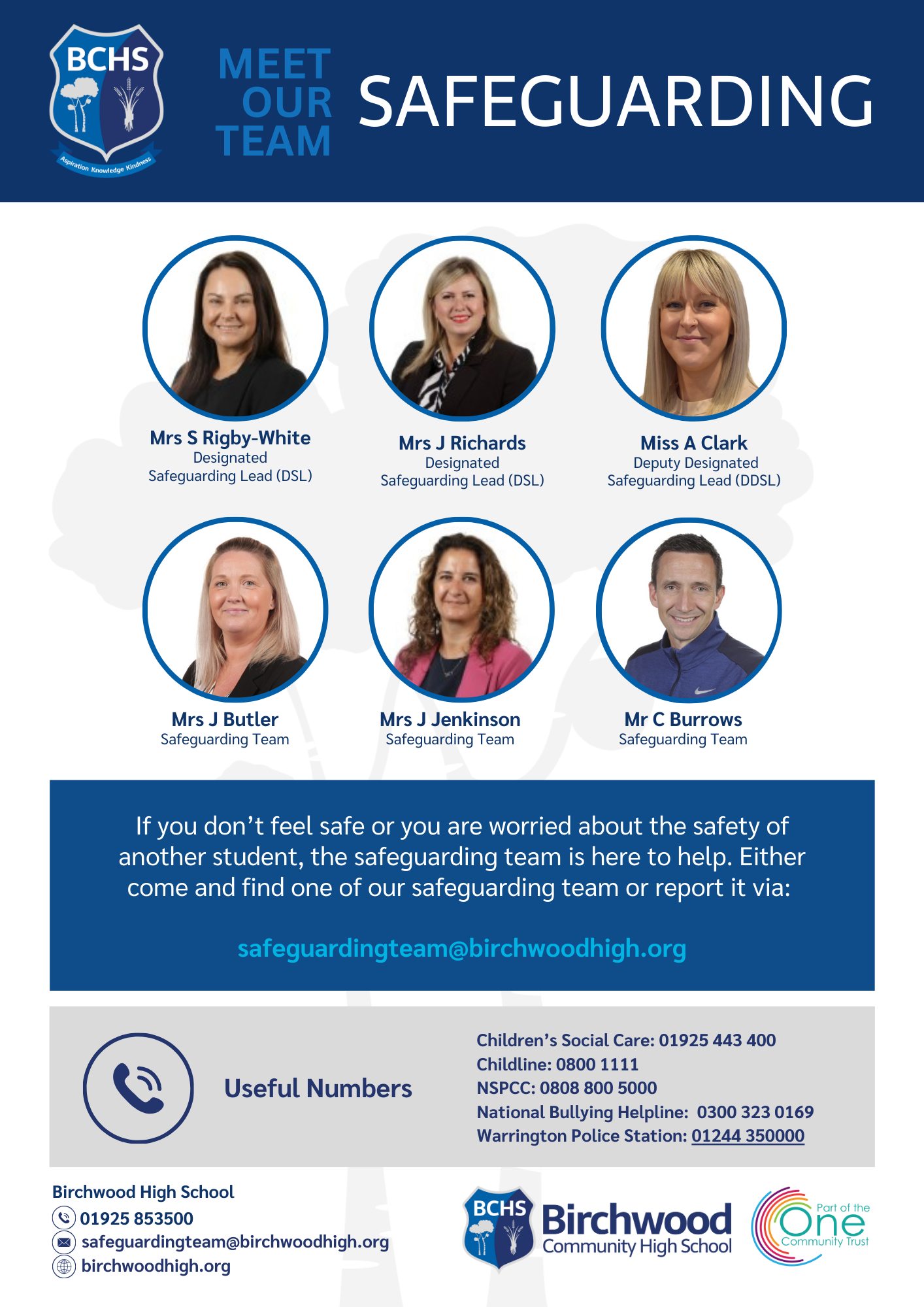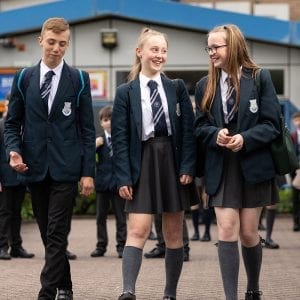Safeguarding at Birchwood Community High School
Birchwood Community High School is committed to the welfare and protection of all students in our care. As a school we recognise that safeguarding and promoting the welfare of children is everyone’s responsibility irrespective of the role they undertake and expect all staff, volunteers and visitors to share this commitment. We are fully committed to ensuring that consistent and effective safeguarding procedures are in place to support children, families and staff at school.
If you are concerned that a child/ young person, is at risk of or experiencing abuse or neglect, or you yourself are a victim of abuse, you should report it straight away so that appropriate action can be taken to prevent harm.
Child abuse includes physical, sexual and emotional abuse, and neglect. You can read more about the signs of child abuse. (NSPCC)
All safeguarding concerns should be reported to a member of our safeguarding team:
Mrs S Rigby-White – Designated Safeguarding Lead / Deputy Headteacher
Mrs J Richards – Designated Safeguarding Lead / Assistant Headteacher
Miss A Clark – Deputy Designated Safeguarding Lead
Mrs J Butler – Safeguarding Team / Deputy Pastoral Manager
Mr C Burrows – Safeguarding Team / Associate Deputy Headteacher
Mrs J Jenkinson – Safeguarding Team / Assistant Headteacher
To contact our safeguarding team please email: safeguardingteam@birchwoodhigh.org
Safeguarding Governor Alison Fisher
Headteacher Ms E Mills
Birchwood Community High School’s Safeguarding policies can be found here.

Birchwood Community High School’s Safeguarding Policy Principles
- Welfare of the child is of paramount importance.
- All children, regardless of age, gender, ability, culture, race, language, religion or sexual identity, have equal rights to protection.
- All staff have an equal responsibility to act on any suspicion or disclosure that may suggest a child is at risk of harm.
- Pupils and staff involved in child protection issues will receive appropriate support.
Early Help at Birchwood Community High School
The purpose of early help is to identify issues early and prevent them from deteriorating by offering families support at the right time.
Any professional working with your family, such as those based in schools, health services, and in voluntary sector organisations, can offer early help services as soon as they can see that advice, support and/or intervention may be needed. Early help works best when it’s offered to the whole family and when services are delivered jointly by professionals.
Early Help Assessments (EHA) are how professionals identify and assess your family’s needs.
We complete the assessment with your family and a range of different organisations, such as schools and health services. This is so the support given meets the needs of the whole family.
An Early Help Assessment means everyone can make sure the support is working and making a difference to your family
Mrs Bird & Ms Mckean are responsible for the Early Help offer at Birchwood Community High School and can be contacted on 01925 853500.
For more information, download the Early Help Brochure 2024-2025
Scan the QR Code for More Information about the local Early Help Support Team
Prevent Duty
As part of the school’s safeguarding measures, we also ensure our students are not exposed to inappropriate political or controversial messages. Through our pursuit to develop exemplary citizens, we promote fundamental British values, including democracy, the rule of law, individual liberty and mutual respect and tolerance of different faiths and beliefs. In line with this, we ensure all expressed views and actions contrary to these values are challenged.
We believe that children should be given the opportunity to explore diversity and understand Britain as a multi- cultural society; everyone should be treated with respect whatever their race, gender, sexuality, religious belief, special need, or disability. As part of our commitment to safeguarding and child protection we fully support the government’s Prevent Strategy.
Prevent is one of the four elements of CONTEST, which is the government’s counter-terrorism strategy. It aims to stop people becoming terrorists or supporting terrorism, provide practical help to prevent individuals from being drawn into terrorism and give appropriate advice and support.
The named Lead’s at Birchwood Community High School are Sam Rigby-White and Angela Clark, who can be contacted on 01925 853500 if you are concerned about a child/young person.
Prevent contact details:
Stephen Gillham – Warrington single point of contact (SPOC) at the LA for Prevent 01925 442216 sgillham@warrington.gov.uk
Counter Terrorism Case Officer for Prevent in the North West can be contacted on:
Further information can be found at:
https://www.gov.uk/government/publications/prevent-duty-guidance
Online safety issues
The internet is a fantastic place for children to learn, create and have fun, but they may occasionally have to deal with a variety of sometimes challenging issues. See advice on a range of online issues that your child may face to help them enjoy the digital world safely and smartly.
Advice by age
Whatever their age, we can help you to find out more about what they might be doing online and give you practical advice on the steps you can take as a parent to keep them safe in their digital world.
Parental Controls
Give your child a safe space to explore their curiosity online. These step by step guides will help you to set up the right controls and privacy settings on the networks, gadgets, apps, and sites they use to give them a safer online experience.
Are you worried about online sexual abuse or the way someone has been communicating with you online? Report it to a CEOP child protection advisor here: https://www.ceop.police.uk/safety-centre/
You’ll find additional help and advice about online safety at:
https://www.childnet.com/young-people
https://www.getsafeonline.org/
http://www.nspcc.org.uk/onlinesafety
Child Criminal Exploitation – County Lines
County lines is a form of criminal exploitation where urban gangs persuade, coerce or force children and young people to store drugs and money and/or transport them to suburban areas, market towns and coastal towns (Home Office, 2018). It can happen in any part of the UK and is against the law and a form of child abuse.
Children and young people may be criminally exploited in multiple ways. Other forms of criminal exploitation include child sexual exploitation, trafficking, gang and knife crime.
County lines gangs are highly organised criminal networks that use sophisticated, frequently evolving techniques to groom young people and evade capture by the police.
Further information can be found at:
https://learning.nspcc.org.uk/child-abuse-and-neglect/county-lines
Cuckooing
Cuckooing is a type of crime where a drug dealer befriends an individual who lives on his or her own. The drug dealer then moves in, takes over the property and turns it into a drugs den.
Victims are often lonely, isolated and vulnerable and may be drug users themselves.
Signs to look out for:
- Increased visitors to an address
- Evidence of drug use in the public areas
- Secure doors wedged open
Contact the Police on 101 or your Housing Office if you have concerns or information.
If you have any information you can contact the independent crime-fighting charity Crimestoppers anonymously on 0800 555 111 or through their anonymous online form at www.crimestoppers-uk.org
No personal details are taken, information cannot be traced or recorded and you will not go to court.
Child Sexual Exploitation
Child sexual exploitation (CSE) is a type of child sexual abuse. It occurs where an individual or group takes advantage of an imbalance of power to coerce, manipulate or deceive a child or young person under the age of 18 into sexual activity (Department for Education, 2017; NIdirect, 2021; Scottish Government, 2018; Wales Safeguarding Procedures Project Board, 2020a).
Children and young people in sexually exploitative situations and relationships are persuaded or forced to perform sexual activities or have sexual activities performed on them in return for gifts, drugs, money or affection.
CSE can take place in person, online, or using a combination of both.
Further information can be found at:
https://www.nspcc.org.uk/what-is-child-abuse/types-of-abuse/child-sexual-exploitation/
Child-on-Child Abuse
Child on Child abuse is sexual abuse that happens between children of a similar age or stage of development. It can happen between any number of children, and can affect any age group (Department for Education (DfE), 2021a).
It can be harmful to the children who display it as well as those who experience it.
Further information can be found at:
https://www.met.police.uk/advice/advice-and-information/caa/child-abuse/peer-on-peer-child-abuse/
Important Information
Safeguarding Information and guidance specifically for children/Young people can be accessed at:
https://www.warringtonsafeguardingpartnerships.org.uk/p/safeguarding-children/welcome-to-the-safeguarding-children-pages
Contact Social Services Children’s Centre on 01925 633913
If you are concerned that a child/young person is in immediate danger of significant harm, please contact the Police immediately.






